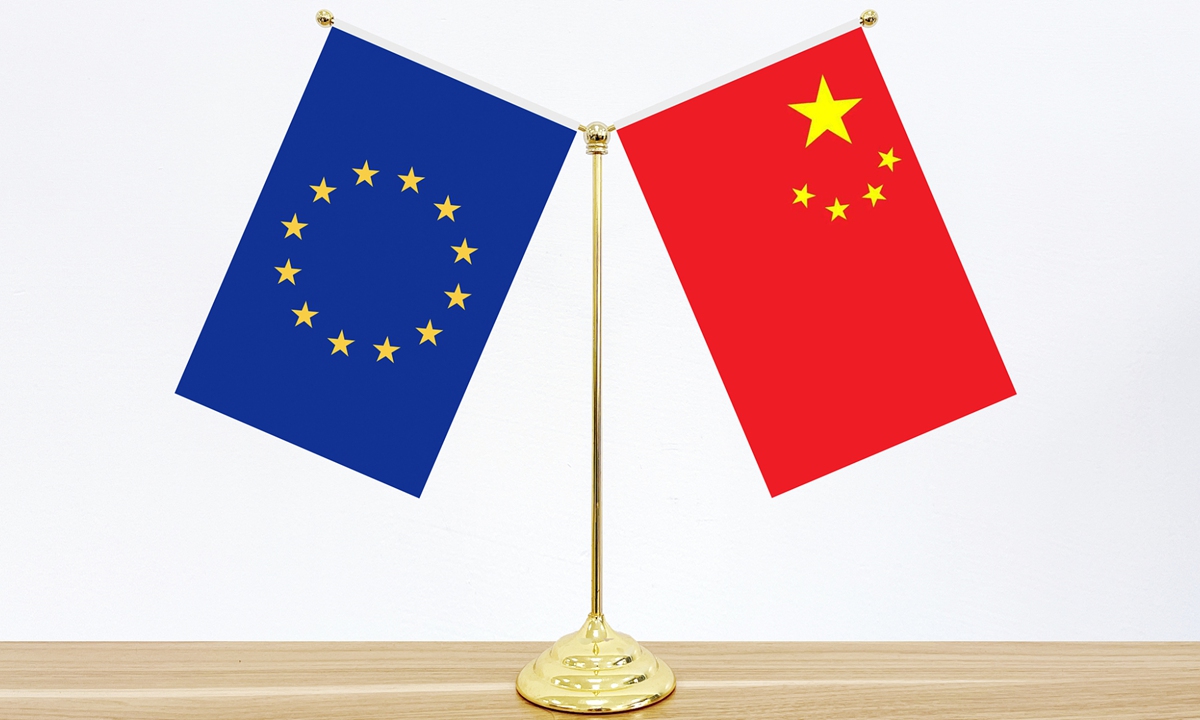
China EU Photo:VCG
China and the EU should maintain mutual openness and cooperation, resist decoupling, and work together to shore up stability of global supply chains, a senior Chinese diplomat said on Saturday, as this year marks the 20th anniversary of the establishment of the comprehensive strategic partnership between China and the EU.
Wang Yi, director of the Office of the Foreign Affairs Commission of the Communist Party of China Central Committee, made the remarks while meeting with Dutch Deputy Prime Minister and Minister of Foreign Affairs Wopke Hoekstra on the sidelines of the 59th Munich Security Conference, Xinhua News Agency reported.
China and the EU are partners, not rivals, and their consensus far outweighs their difference, Wang said, noting that the essence of China-EU economic and trade relations is complementary and mutually beneficial.
Wang's remarks came as the US government continues to push its allies, especially the Netherlands, in banning chip machinery exports to China in a bid to exclude China's semiconductor industry from the global innovation system.
"It's very unlikely for the Netherlands and the EU to follow the US in pursuing a decoupling from China, given the prominence of the huge Chinese market," Sun Yanhong, a research fellow at the Chinese Academy of Social Science's Institute of European Studies, told the Global Times on Sunday.
"The semiconductor industry is a globally integrated high-tech industry, which is highly dependent on innovation and cooperation. Inappropriate intervention by some governments can cause serious disruptions to global manufacturing," the China Semiconductor Industry Association (CSIA) said on Wednesday, in response to a reported deal the US, the Netherlands and Japan have reached on new and strict export restrictions on chip-making equipment to China.
At current stage, American firms lead in semiconductor design, European companies such as the Netherlands' ASML provide advanced manufacturing equipment, Japan has many upstream materials like photoresist, while South Korea's Samsung and SK Hynix are giant memory chip producers and the island of Taiwan dominates the foundry market. The Chinese mainland is the world's largest consumption market for chips.
"The Netherlands has a stockpile of deep ultraviolet lithography (DUV) machines, and the largest growing market is China. There will be great damage to Dutch economy if it agrees to ban DUV exports to China," Xiang Ligang, director-general of the Beijing-based Information Consumption Alliance, told the Global Times.
Xiang said China has been prepared for the US' comprehensive chip containment for a long time. There have been a couple of lithography machine manufacturers in China, which have formed two to three groups with tens of billions of yuan in investment as well as orders, he said. He said that "it's not surprising for Chinese firms to make great breakthroughs".
ASML CEO Peter Wennink lately said China accounted for around 15 percent of its sales in 2022 and will be at a "similar" market position this year, despite US restrictions, CNBC reported.
The massive Chinese market is also indispensible for the EU's overall economic recovery in the post-pandemic era, Sun said, noting that the recent influx of Chinese visitors to European countries including France, Italy and other countries will help drive local economies.
The European Commission has lifted its GDP growth outlook for 2023 to 0.8 percent, with the area is likely to narrowly avoid a technical recession.
The commission pointed out that external demand could also turn out to be more robust following China's re-opening.
China and the EU have maintained close economic and trade cooperation for many years, with China becoming the largest trade partner of the EU since 2020. In 2022, bilateral trade maintained stable growth to hit $847 billion, an increase of 2.4 percent year-on-year, China's General Administration of Customs said.




